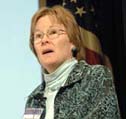 |
   |
|
December 12, 2008
Retreat Refreshes Behavioral, Social Sciences
 Dr. Christine Bachrach
Dr. Christine Bachrach
Dr. Christine Bachrach, acting director of the Office of Behavioral and Social Sciences Research, wanted just one thing out of the first-ever day-long retreat for NIH’s widely dispersed community of behavioral and social scientists, held Nov. 12 at Natcher Bldg.
December 12, 2008
CBT4CBT
New Hope for Treatment of Addiction
 Dr. Kathleen Carroll
Dr. Kathleen Carroll
Drug addiction is notoriously tough to treat, but now research is showing a fresh way to tackle the problem. It’s called computer-based training for cognitive-behavioral therapy (CBT4CBT)
OBSSR’s Mabry Wins with Systems Analysis Team
 OBSSR’s Mabry Wins with Systems Analysis Team
OBSSR’s Mabry Wins with Systems Analysis Team
More News >>
|
  |
|
January 28-29, 2009 Dissemination and Implementation Conference
February 9, 2009, 10:00 – 11:00 AM
Stigma: Lessons & New Directions from a Decade of Research on Mental Illness
July 12-24, 2009
OBSSR/NIH Summer Training Institute on Randomized Clinical Trials Involving Behavioral Interventions
May 3-8, 2009
Institute on Systems Science and Health
May 22-25, 2009
Gene-Environment Interplay in Stress and Health at the Association for Psychological Science 21st Annual Convention, San Francisco, CA
More Events >>
|
|
|
 |
 |
 |
 |
|
Home > About OBSSR > Staff
|
David B. Abrams, Ph.D.
Director, 2005-2008
Office of Behavioral and Social Sciences Research
|

Dr. David B. Abrams was Director of the Office of Behavioral and Social Sciences Research (OBSSR) in the Office of the Director (OD)
of NIH. OBSSR serves as the focal point for establishing agency-wide policies and goals in behavioral and social sciences research.
OBSSR functions as a liaison between the NIH intramural and extramural communities, other Federal agencies, academic and scientific
societies, national voluntary health agencies, the biomedical research community, the media, and the general public on matters
pertaining to behavioral and social sciences research.
Prior to joining OBSSR, Dr. Abrams was Professor of Psychiatry and Human Behavior and Professor of Community Health at Brown University
Medical School, Providence, Rhode Island and co-director of Transdisciplinary Research at Brown-affiliated Butler Hospital. Dr. Abrams
holds a B.Sc. (honours) in computer science and psychology from the University of Witwatersrand, Johannesburg, South Africa and Masters
and Doctoral degrees in Clinical Psychology from Rutgers University, New Jersey. He joined Brown University in 1978 and he was the
founding Director of the Centers for Behavioral and Preventive Medicine for the past 16 years. Dr. Abrams is a licensed clinical
psychologist, specializing in health psychology/behavioral and preventive medicine. His research is on addictive behaviors and
lifestyle risk factors for chronic disease.
Dr. Abrams is a past President of the Society of Behavioral Medicine, a fellow and a recipient of the Societies distinguished
scientist award, a fellow of the American Psychological Association, a member of the Board of Scientific Advisors of the National
Cancer Institute, and a member of the Robert Wood Johnson Foundation's Transdisciplinary Tobacco Etiology Research Network. He has
served various expert consultant roles nationally and internationally including: chaired the NCI program review group on Cancer
Control; consulted to the National Cancer Institute of Canada and the Osaka Cancer Center, Japan; served on numerous NIH consensus
panels and review groups; member, External Scientific Advisory Board of several NCI Designated Cancer Centers; invited contributor,
1988 U.S. Surgeon General's Report on Smoking and Health: Nicotine Addiction; reviewer, National Academies of Science (NAS),
Institute of Medicine (IOM) 2004 report Improving Medical Education: Enhancing Behavioral and Social Sciences in Medical School
Curricula; and served on other NAS-IOM expert panels on Prevention of Alcohol Abuse and Reducing Tobacco Use Prevalence.
Dr. Abrams has published over 220 scholarly articles, has been a Principal or Co-Investigator on over 65 research grant awards
from various NIH Institutes, most recently including Principal Investigator of a NCI program project award -Transdisciplinary
Tobacco Use Research Center and an R-25 Career Development Training Grant -Transdisciplinary Training of Scientists in Cancer
Prevention, Control and Population Sciences. Dr. Abrams is the lead author of The Tobacco Dependence Treatment Handbook: A Guide
to Best Practices: Guilford Press, 2003 - a recipient of a book of the year 2004 award from the American Journal of Nursing.
Dr. Abrams' research contributions range from basic human laboratory research on bio-behavioral mechanisms in the self-regulation
of addictive behavior, to outcomes evaluation of behavior change interventions in clinical and community settings, to health policy
research. His primary research foci over the past 25 years have included: (1) basic scientific research on self-control mechanisms
in nicotine, alcohol, stress and mood regulation; (2) translational clinical research on evaluating behavioral/pharmacological
treatments for tobacco and alcohol abuse, obesity and physical activity; and (3) on dissemination and policy-related research to
improve the widespread delivery of cost-efficient interventions to defined populations and across settings and channels including
worksites and most recently using new bio-informatics screening technologies and interactive communications via the internet.
Dr. Abrams has had an abiding interest in systems theory, conceptual models to improve population health and in the processes that
nurture the training of scientists to conduct team science, that is research that fosters a transdisciplinary and translational
integration among biomedical, socio-behavioral, and public health disciplines to reduce population level metrics of preventable
disease burden and improve the public health.
|
|
|
 |
 |
 |
 |
|
|
 |